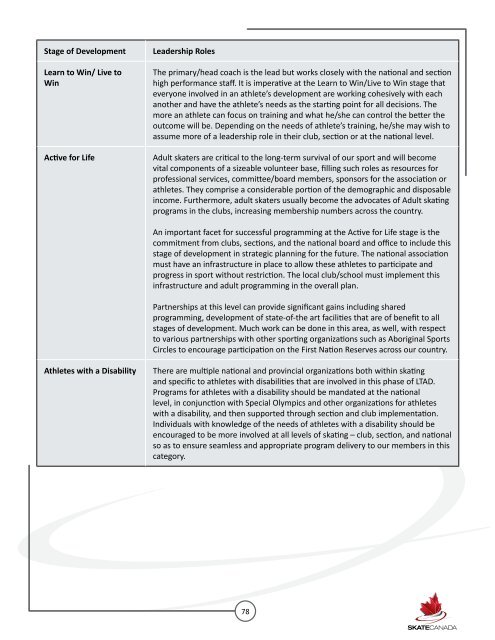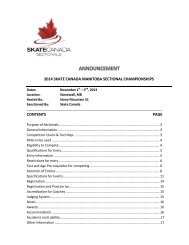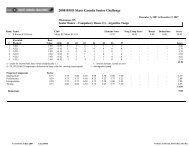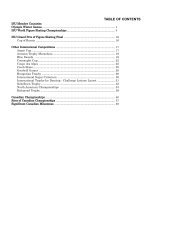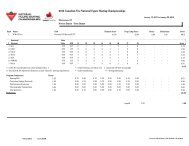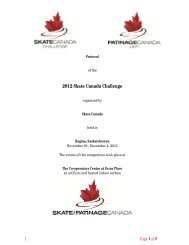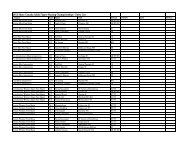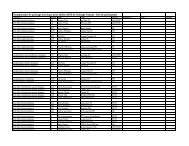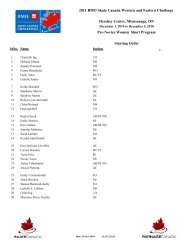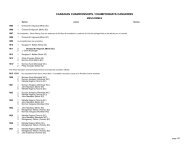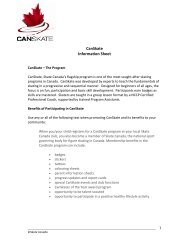LONG-TERM ATHLETE DEVELOPMENT - Skate Canada
LONG-TERM ATHLETE DEVELOPMENT - Skate Canada
LONG-TERM ATHLETE DEVELOPMENT - Skate Canada
Create successful ePaper yourself
Turn your PDF publications into a flip-book with our unique Google optimized e-Paper software.
Stage of Development Leadership Roles<br />
Learn to Win/ Live to<br />
Win<br />
865 Sheord Road, Ottawa, Ontario K1J 1H9<br />
Phone 613.747.1007 I Toll Free 1.888.747.2372 I Fax 613.748.5718 I Toll Free Fax 1.877.211.2372<br />
The primary/head coach is the lead but works closely with the national and section<br />
high performance staff. It is imperative at the Learn to Win/Live to Win stage that<br />
everyone involved in an athlete’s development are working cohesively with each<br />
another and have the athlete’s needs as the starting point for all decisions. The<br />
more an athlete can focus on training and what he/she can control the better the<br />
outcome will be. Depending on the needs of athlete’s training, he/she may wish to<br />
assume more of a leadership role in their club, section or at the national level.<br />
Active for Life Adult skaters are critical to the long-term survival of our sport and will become<br />
vital components of a sizeable volunteer base, filling such roles as resources for<br />
professional services, committee/board members, sponsors for the association or<br />
athletes. They comprise a considerable portion of the demographic and disposable<br />
income. Furthermore, adult skaters usually become the advocates of Adult skating<br />
programs in the clubs, increasing membership numbers across the country.<br />
An important facet for successful programming at the Active for Life stage is the<br />
commitment from clubs, sections, and the national board and office to include this<br />
stage of development in strategic planning for the future. The national association<br />
must have an infrastructure in place to allow these athletes to participate and<br />
progress in sport without restriction. The local club/school must implement this<br />
infrastructure and adult programming in the overall plan.<br />
Partnerships at this level can provide significant gains including shared<br />
programming, development of state-of-the art facilities that are of benefit to all<br />
stages of development. Much work can be done in this area, as well, with respect<br />
to various partnerships with other sporting organizations such as Aboriginal Sports<br />
Circles to encourage participation on the First Nation Reserves across our country.<br />
Athletes with a Disability There are multiple national and provincial organizations both within skating<br />
and specific to athletes with disabilities that are involved in this phase of LTAD.<br />
Programs for athletes with a disability should be mandated at the national<br />
level, in conjunction with Special Olympics and other organizations for athletes<br />
with a disability, and then supported through section and club implementation.<br />
Individuals with knowledge of the needs of athletes with a disability should be<br />
encouraged to be more involved at all levels of skating – club, section, and national<br />
so as to ensure seamless and appropriate program delivery to our members in this<br />
category.<br />
78


